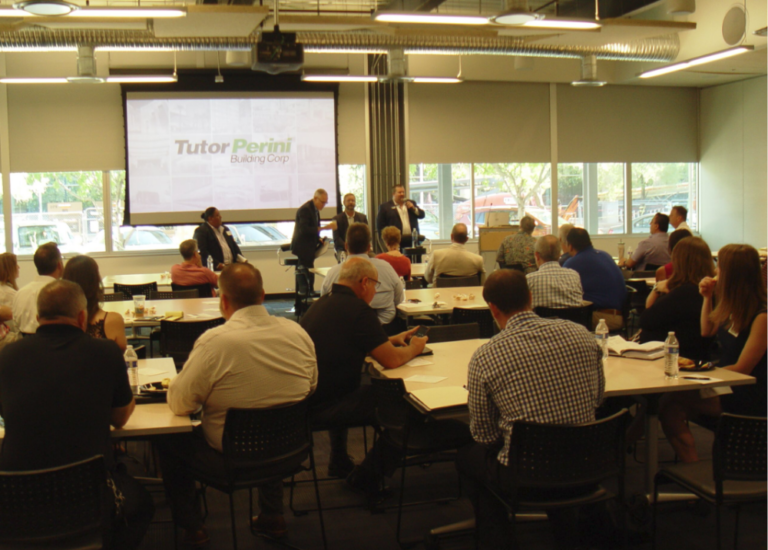By Sammy Williams for AZBEX
The latest in the BEX Leading Market Series found attendees gathered at SkySong in Scottsdale on Thursday, August 1st to discuss the current state of the hospitality sector.
BEX Vice President of Operations Rachel Pratt kicked off the breakfast with an overview of the hospitality industry, which is comprised of hotels and resorts, sports and entertainment venues and theme parks.
With tourism as a major driver of Arizona’s economy, it’s no surprise that hotel and resort projects make up the majority (75 percent) of current projects. Sports and entertainment (16 percent) and theme parks (9 percent) round out the $4.7B in projects on the books for the next two to three years.
Using information collected from the BEX Database, Pratt described the mix of owners, designers and contractors for upcoming large hospitality projects.
“Fifteen percent of design firms are yet to be selected for these projects, and thirty percent of projects do not yet have a general contractor,” said Pratt, one of many statistics that magnified the opportunities for attendees and their firms.
After outlining the market, Pratt went on to introduce the moderator, Chris Creasey, Director of Business Development for Tutor Perini Building Corp. Creasey then welcomed the panelists: Jeff Denzak, Partner, Swaback; Chad Weaver, Community Development Director, City of Tempe; and Barney Enos, Jr., Councilman, Gila River Indian Community (GRIC).
Upcoming Projects
Denzak gave attendees an inside look at Museum Square, a fixed-use master planned community in the South Scottsdale arts districts. The seven-acre, $350M project has been 2.5 years in the making, and centers around The Arizonan, a hotel with approximately 200 rooms. Three condominiums, an apartment complex, retail and restaurants round out the development.
Denzak also previewed Sereno Canyon in North Scottsdale, a 350-acre site nestled in the McDowell Mountains.
“The original plan was large custom home lots, but we’re finding that customer bandwidth is narrowing,” said Denzak.
Instead, Swaback worked with Toll Brothers to create a hybrid gated resort community with mountain cottages, resort vacation homes and estate homes designed primarily for second home buyers. The 15KSF $20M Mountain House Lodge will anchor the development and offer luxury amenities for all residents.
Weaver kicked off his presentation with a map of nine new hotels in various stages of development in Tempe, most notably the OMNI project, which would bring a large convention hotel to the city.
“We’ll be adding 2,600 rooms to Tempe if everything comes to fruition,” said Weaver.
Tempe’s Urban Core Planning Effort has been underway for the past 18-20 months, focused on projecting development in the City for the next 20 to 30 years, according to Weaver.
“I’m in the business of building a community and adding to the quality of life in Tempe, and that means making sure these developments relate to the surroundings in a meaningful way,” Weaver said.
Enos Jr., who serves on the casino expansion owners’ team for GRIC, previewed the Wild Horse Pass Resort multi-phase expansion, including a 200-room tower.
“The renovation project would add more than 160KSF, with 34KSF of convention space,” Enos Jr. said.
Current Challenges
After highlighting their upcoming projects, the panelists discussed current challenges in the hospitality market.
Creasey touched on construction labor as a central issue, saying, “While wages are relatively stable, productivity is going down, and financial backers just don’t understand that.”
The panelists agreed that sustainability and sourcing materials is also difficult, with Denzak remarking that, “Our hospitality clients want to see products and materials made in the U.S., meet sustainability goals and hire local consultants.”
In terms of traffic, resorts are looking at much more modest parking counts, with Denzak attributing that shift to the growth of ride-share services.
Weaver added, “We have problems convincing folks to accept less parking in Tempe,” saying the goal is to rely on public transportation and get parking spaces down to zero or less than one per hotel key.
Future Trends
The consensus among the panelists was the hospitality industry is looking to integrate with the surrounding environment, providing more mixed-use features and an improved guest experience.
“We are focused on improving design standards so everything comes together seamlessly, essentially creating a community within the community,” said Enos Jr.
Finally, many of the projects were confidential due to the rise in demand for NDAs.
“I’ve probably signed more NDAs in last 12 months than I have in the past 10 years,” said Denzak.
The next Leading Market Series topic will be on Data Centers on November 13th. To check out dates and topics or to register for the next event, visit: http://lms.azbex.com/

